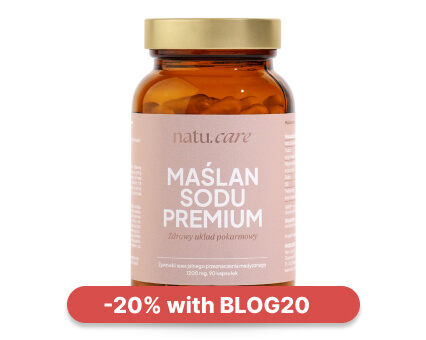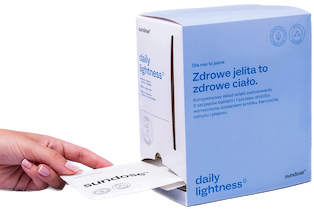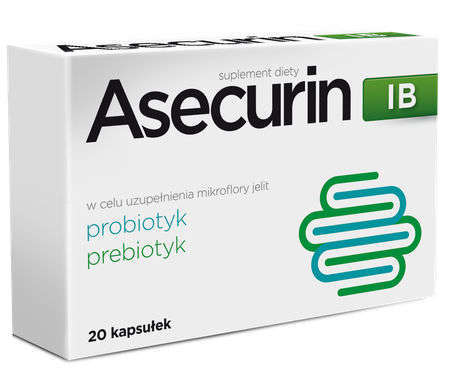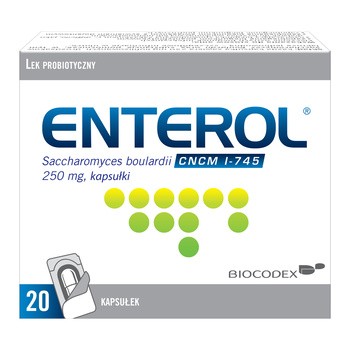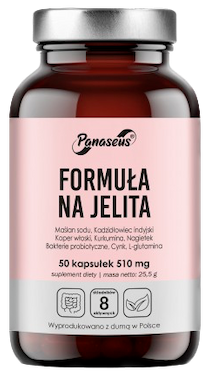When to take the probiotic: before or after the antibiotic, in the morning or in the evening?
When to take probiotics and how to use them to ensure they are most effective.


Learn more about our editorial process
.

Learn more about our editorial process
.

Learn more about our editorial process
.

Learn more about our editorial process
.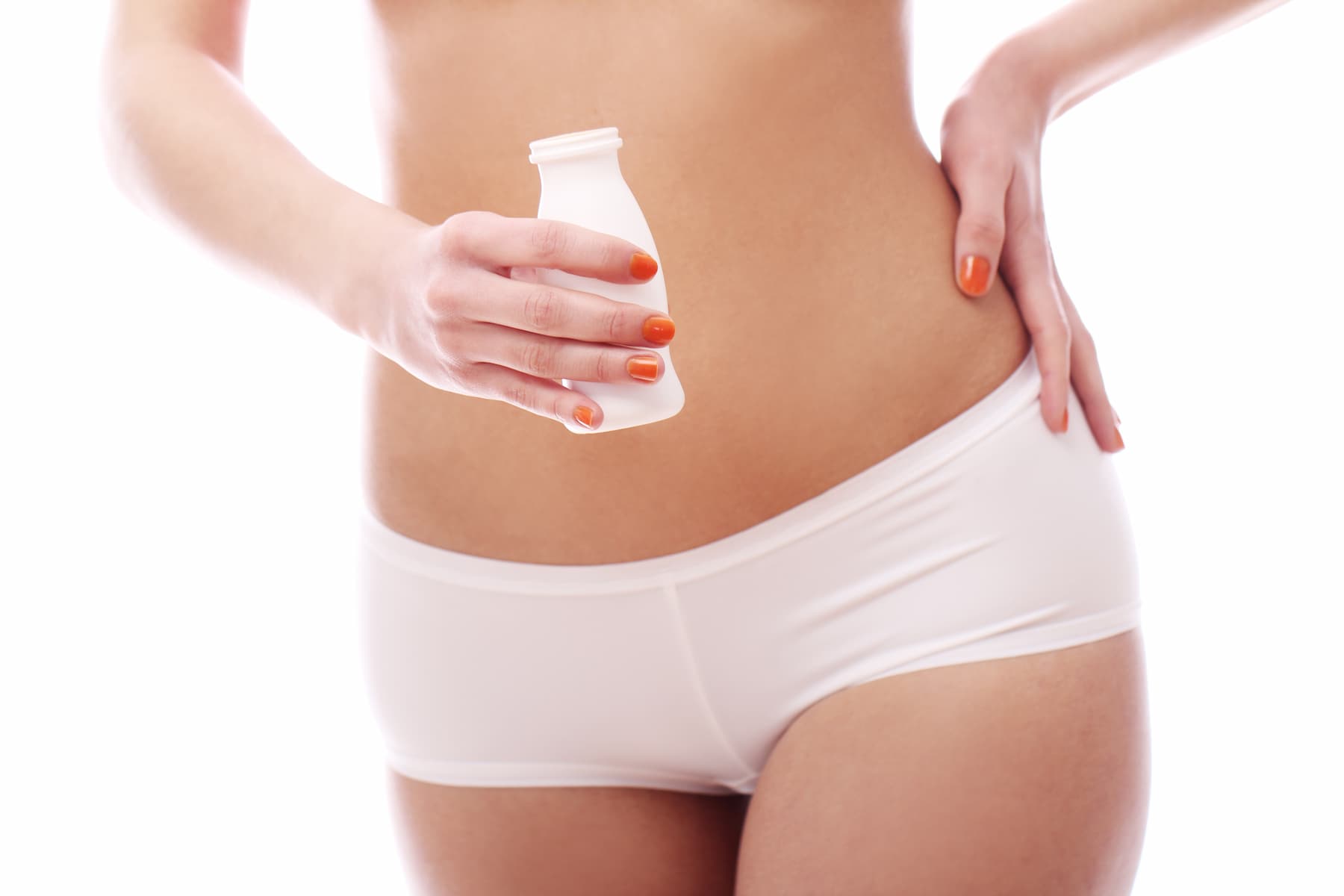
Why you can trust us
Articles on Natu.Care are written based on scientific research, data from government websites and other reliable sources. The texts are written in cooperation with doctors, nutritionists and other health and beauty experts. Articles are reviewed before publication and during significant updates.
.Learn more about our editorial process
.Information about advertisements
Content on Natu.Care may contain links to products from the sale of which we may receive a commission. When creating content, we adhere to high editorial standards and take care to be objective about the products discussed. The presence of affiliate links is not dictated by our partners, and we select the products we review ourselves completely independently.
.Learn more about our terms and Conditions
.You buy a probiotic and everything seems so easy - you just have to start taking it. But when it comes down to it, a mass of doubts arise. For example: does the time of day matter?
.
A probiotic is, after all, live bacteria that are supposed to survive in your digestive system and make their way to your intestines. You want to make it easy for them to do this so that they bring you the best results. That's why, together with Ilona Krzak, MSc in pharmacy, we will break down the question: when to take a probiotic?
.
First you will learn, when (in which cases) a probiotic can be helpful. Later you will find specific advice when (i.e. at what time) to take preparations with live bacteria cultures.
From this article you will learn:
.- What a probiotic can help with. .
- How to take it if you are taking an antibiotic. .
- Whether it is better to take it with food or on an empty stomach.
- Whether it is better to take it with food or on an empty stomach.
- Whether the time of day and the number of servings make a difference when taking a probiotic. .
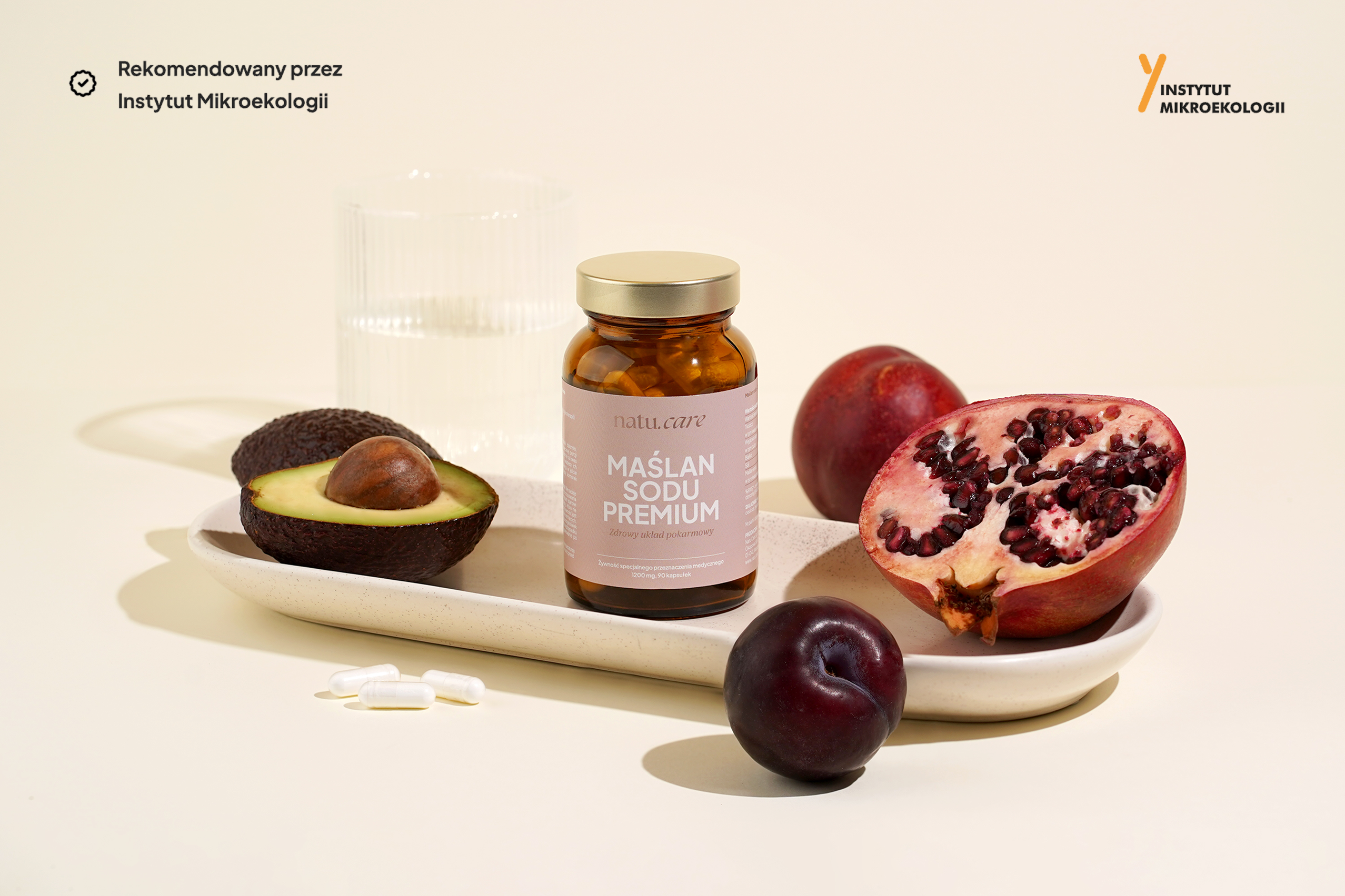
Odkryj korzyści, jakie niesie ze sobą Maślan Sodu Premium od Natu.Care!
Natu.Care Maślan Sodu Premium
Poznaj Maślan Sodu Premium – najwyższej jakości suplement wspierający zdrowie jelit. Maślan sodu pomaga w regeneracji nabłonka jelitowego, poprawia trawienie i wspiera naturalną równowagę mikroflory.
Sprawdź cenę
W końcu się lepiej czuję! Pożegnałam się ze wzdęciami i zaparciami a do tego poprawił się stan mojej cery bo zdrowe jelita to też zdrowa i piękna skóra. Polecam!@Klaudia F.
See also:
.
- What is a probiotic? .
- What is a prebiotic?
- What is a synbiotic?
- What probiotic to choose for the gut?
- Do probiotics lose weight?
- Which probiotic for pregnant women?
- What probiotic for gynecological problems?
- Which probiotic is best?
- What is sodium butyrate?
- What is butyric acid?
- What is a psychobiotic?
For which ailments to take probiotics?
.
You will most often hear about probiotics when your doctor prescribes you an antibiotic. At that time, it is very likely that you will be advised to take these beneficial bacteria salivarily. However, protecting your gut microflora from medication is not the only value these microorganisms can give you.
Patients often confuse the 'shield' to an antibiotic with the 'shield' used when taking the powerful NSAID drugs - proton pump inhibitors. It is also worth mentioning that proton pump inhibitors alter the pH of the gastrointestinal tract, which interferes with the functioning o development of the microbiome..
 .
.
Ilona Krzak Master of Pharmacy
Your gut and its little inhabitants affect metabolism, insulin management, and immunity. They can support you in the fight against inflammation, and may even be responsible for synthesising relevant neurotransmitters that affect your moodand.
Antibiotic therapy
.
Antibiotics are an extremely effective tool in the fight against bacterial infections. Their function is to eliminate the pathogenic microorganisms that cause disease. Unfortunately, these drugs do not know which bacteria are 'bad' and which ones ensure the proper functioning of your body.
Antibiotics therefore destroy not only the harmful but also the beneficial probiotic bacteria. Without them, your digestive system is at risk of being colonised by pathogens that can cause diarrhoea. The process of digesting food itself is also not as smooth - you may experience unpleasant discomforts such as heartburn or abdominal painand.
Post-antibiotic diarrhoea can occur up to one to two months after the end of antibiotic therapy. Some antibiotics also have a post-antibiotic effect, so that they have a longer antimicrobial effect. It is also worth mentioning that there are broad-spectrum and narrow-spectrum antibiotics. Some will decimate the microbiome, while others will only slightly disturb its stability..
 .
.
Ilona Krzak Master of Pharmacy
.
Particular attention to taking a probiotic while on antibiotic therapy should be given to people with obesity, inflammatory bowel disease, liver disease and recurrent infections of Clostridioides difficile, among others, due to the reduced diversity of the gut microbiome, adds pharmacist.
Probiotics are live cultures of bacteria that have health benefits when consumed in adequate amounts. The most common probiotic bacteria are those of the Lactobacillus and Bifidobacterium species. They are natural inhabitants of your digestive system, and their presence is crucial to gut health and overall wellbeingand.
About 25% of the gut microflora of adults and 95% of the gut microflora of newborns and infants consists mainly of various species of Bifidobacterium: B. catenulatum, B. bifidum, B. infantis, B. brevi, B. adolescentis etc..
 .
.
Ilona Krzak Master of Pharmacy
.
During antibiotic treatment, probiotics can help in several key aspectsand:
Protect the gut microflora. Antibiotics destroy all bacteria, leading to disorganisation of the natural gut microflora. Probiotics can help to rebuild it by filling in the cavities destroyed by drugs, thus supporting the health of the digestive system.
Prevent antibiotic-related diarrhoea. This is a common side effect of antibiotic therapy. Studies show that probiotics can reduce the risk of diarrhoea associated with antibiotic therapy by stabilising the gut microflora.
Species of the family Escherichia coli and Enterococcus are commensal inhabitants of the gastrointestinal tract that, in a dysbiotic environment, can become pathogens causing a range of illnesses such as diarrhoea, vomiting or persistent intestinal inflammation associated with antibiotics. Probiotic supplementation appears to reduce Escherichia overgrowth during antibiotic therapy..
 .
.
Ilona Krzak Master of Pharmacy
.
As reported expert pharmacist, efficacy in preventing post-antibiotic diarrhoea is demonstrated by:
- Saccharomyces boulardii I-745, .
- L. casei DN114001, .
- a mixture of three strains - Lactobacillus acidophilus CL1285, L. casei Lbc80r, L. rhamnosus CLR2. .
Strengthen the immune system. Probiotics can support the immune system, improving the body's ability to fight pathogens. This is particularly important during antibiotic therapy, when the body's natural defences may be lowered.
.
After antibiotic treatment, rebuilding the gut microbiome can take some time. After short-term use of these medications (5 to 10 days), studies have observed that it can take at least one to two months for most bacterial groups to return to pre-antibiotic levelsand.
The intestinal microflora regenerates in about 2 weeks after a single exposure to an antibiotic in adults, but repeated exposures can significantly prolong the recovery time..
 .
.
Ilona Krzak Master of Pharmacy
.
The study also showed that even after two to four years, some groups of bacteria do not completely recover, and that antimicrobial resistance genes can also persist at elevated levels for at least one to two years after antibiotic treatment. Even a short antibiotic treatment can have a long-term impact on the gut microbiomeand.
Premium Sodium Butyrate
Product description
Premium Sodium Butyrate is a natural support for your digestive system. With a high dose of butyric acid (940 mg), it supports the regeneration of the intestinal mucosa, improving gut health and function, and aids in the absorption of nutrients. By taking care of your intestines, you're taking care of the health of your entire body.
Studies involving people suffering from irritable bowel syndrome confirm that sodium butyrate is ideal for supporting issues related to bacterial flora imbalances (for example, after antibiotic therapy), constipation and diarrhea, inflammation of the intestinal mucosa, or a diet low in fiber.
Premium Sodium Butyrate capsules are made using the innovative DRcaps® technology. This guarantees that the active ingredients in the product are protected from the destructive effects of stomach acids and digestive enzymes. As a result, we can be sure that the beneficial ingredients are released in the small intestine and are fully absorbed by our body.
Premium Sodium Butyrate from Natu Care is 100% tested, and its composition contains only the highest quality raw materials.
Pros and cons
Pros:
- Supports digestive system function
- Helpful for various gastrointestinal conditions, including IBS
- High dose of butyric acid in each capsule
- Eco-friendly, clean, and tested composition
- Free from added sugar, gluten, GMOs, and lactose
- Innovative capsule technology - DRcaps
Cons:
- None
Additional Information
Take 3 capsules daily at any time of the day, preferably with a meal. Swallow the capsules whole with water.
Premium Sodium Butyrate is intended for adults.
The product should be used under medical supervision.
User review
I've been using the product for 2 weeks. My stomach feels lighter, and my digestion has improved. I recommend it.
Sundose° Daily Lightness°
Product description
Sundose° Daily Lightness° is a formula thatós supports the stomach and liver, reduces the frequency of gasóing and bloating, and supports optimal digestion. The formula contains no unnecessary additivesós, and the composition of the active ingredients (e.g. curcumin with piperine) mutually enhances their absorption.
The dietary supplement from Sundose comes in two flavour versions: orange and green.
Pros and cons
Sundose° Daily Lightness° is a formula thatós supports the stomach and liver, reduces the frequency of gasóing and bloating, and supports optimal digestion. The formula contains no unnecessary additivesós, and the composition of the active ingredients (e.g. curcumin with piperine) mutually enhances their absorption.
The dietary supplement from Sundose comes in two flavour versions: orange and green.
Additional information
Sundose° Daily Lightness° is a formula thatós supports the stomach and liver, reduces the frequency of gasóing and bloating, and supports optimal digestion. The formula contains no unnecessary additivesós, and the composition of the active ingredients (e.g. curcumin with piperine) mutually enhances their absorption.
The dietary supplement from Sundose comes in two flavour versions: orange and green.
Sundose° Daily Lightness° is a formula thatós supports the stomach and liver, reduces the frequency of gasóing and bloating, and supports optimal digestion. The formula contains no unnecessary additivesós, and the composition of the active ingredients (e.g. curcumin with piperine) mutually enhances their absorption.
The dietary supplement from Sundose comes in two flavour versions: orange and green.
Asecurin IB
Product description
Asecurin IB is a synbiotic, i.e. a combination of a probiotic and a prebiotic. It contains bacteria and yeast to support the intestines and digestive system, as well as inulin, whichós food for these microorganisms. The addition of a prebiotic supports and accelerates the growth of beneficial bacterial flora in the intestines.
Pros and cons
Asecurin IB is a synbiotic, i.e. a combination of a probiotic and a prebiotic. It contains bacteria and yeast to support the intestines and digestive system, as well as inulin, whichós food for these microorganisms. The addition of a prebiotic supports and accelerates the growth of beneficial bacterial flora in the intestines.
Additional information
Asecurin IB is a synbiotic, i.e. a combination of a probiotic and a prebiotic. It contains bacteria and yeast to support the intestines and digestive system, as well as inulin, whichós food for these microorganisms. The addition of a prebiotic supports and accelerates the growth of beneficial bacterial flora in the intestines.
Biocodex Enterol
Product description
Enterol is an OTC medicine containing a strain of yeastów particularlyóhelpful in the treatment of diarrhoea caused by infections or so-called travel diarrhoea. It is also recommended as a protective treatment of the intestines during antibiotic intake.
.
Pros and cons
Enterol is an OTC medicine containing a strain of yeastów particularlyóhelpful in the treatment of diarrhoea caused by infections or so-called travel diarrhoea. It is also recommended as a protective treatment of the intestines during antibiotic intake.
.
Additional information
Enterol is an OTC medicine containing a strain of yeastów particularlyóhelpful in the treatment of diarrhoea caused by infections or so-called travel diarrhoea. It is also recommended as a protective treatment of the intestines during antibiotic intake.
.
Enterol is an OTC medicine containing a strain of yeastów particularlyóhelpful in the treatment of diarrhoea caused by infections or so-called travel diarrhoea. It is also recommended as a protective treatment of the intestines during antibiotic intake.
.
Product description
Using Panaseus Digestive Formula can help improve intestinal health by supporting the intestinal barrier, reducing inflammation, protecting against damage and restoring healthy intestinal microflora.
Experience a rós difference in gut function with plant extracts, amino acids and probiotic bacteria.
Pros and cons
Using Panaseus Digestive Formula can help improve intestinal health by supporting the intestinal barrier, reducing inflammation, protecting against damage and restoring healthy intestinal microflora.
Experience a rós difference in gut function with plant extracts, amino acids and probiotic bacteria.
Additional information
Using Panaseus Digestive Formula can help improve intestinal health by supporting the intestinal barrier, reducing inflammation, protecting against damage and restoring healthy intestinal microflora.
Experience a rós difference in gut function with plant extracts, amino acids and probiotic bacteria.
See also:
.
Intestinal ailments
.
One of the most important benefits of probiotics is their ability to relieve intestinal ailments. This is because probiotics help to maintain the balance of the gut microflora, which is crucial to the proper functioning of the digestive system. When this balance is disrupted, for example by illness or a diet low in fibre, you may experience a variety of gastrointestinal complaints such as diarrhoea, constipation or irritable bowel syndrome (IBS)and.
Some strains of probiotics also have anti-inflammatory properties, meaning that they can help relieve inflammation in the gut that accompanies conditions such as Crohn's disease or ulcerative colitis. They work by reducing the production of pro-inflammatory cytokinesand.
In addition, probiotics can support gut health in other ways. They help with digestion and nutrient absorption, support the gut's natural protective barrier, and support the production of mucus that lining the gut .
Remember, however, that although probiotics can be helpful, they are not a substitute for either a healthy diet and lifestyle or appropriate treatment for bowel conditions. It is always a good idea to consult your doctor or dietitian before starting probiotic supplementation, especially if you suffer from any chronic conditions.
See also:
Exotic travel
.
When you travel to exotic countries, you often eat different things than you would at home. You also expose yourself to new bacteria and viruses that can upset the balance of bacterial flora in your digestive system. And this can end up in gastrointestinal complaints that can spoil the whole trip.
By taking probiotics prophylactically for about two weeks before and during your trip, you make it more difficult for other 'exotic' types of pathogenic bacteria to colonise your gut. Probiotics will hinder them from colonising, competing with them for food, and producing substances that contribute to the death of pathogensand.
They also help the body to digest effectively and help rid the body of toxins. By strengthening the intestinal barrier, they will also reduce the amount of harmful substances and viruses entering the bloodstream .
Strengthening immunity
.
Did you know that we have between 1 and 3 kg of bacteria in our intestines?.
 .
.
Ilona Krzak Master of Pharmacy
Your body is home to trillions of bacteria. Many of these are found in your digestive tract, forming what we call the gut microbiota. The microbiota has a direct impact on your immunity. Why? Because around 70% of immune cells are found right in your digestive tractand.
A coincidence? In nature, nothing happens by chance! The digestive system, is the first barrier of protection against external pathogens. Everything we supply with food must be carefully verified for safety. If this barrier is disturbed, various abnormalities occur in the form of dyspeptic complaints..
 .
.
Ilona Krzak Master of Pharmacy
Probiotics, as part of this microbiota, help to maintain a balance between 'good' and 'bad' bacteria. When this balance is maintained, your immune system works effectively. Probiotics can help fight infections by stimulating antibody production and supporting immune cell activityand.
Additionally, probiotics are able to produce special substances called short chain fatty acids ( short chain fatty acids - SCFAs). These substances nourish the intestinal epithelial cells, which helps to maintain their health and integrity. This allows fewer pathogenic organisms and toxins to pass through the intestinal wall into the bloodstream, which means less work for the immune systemand.
Decreased mood
.
Some strains of probiotic bacteria are so-called psychobiotics. Research shows that taking psychobiotics can help people suffering from anxiety disorders. Some psychobiotics have also been shown to alleviate symptoms of depressionand.
How is it possible that gut-dwelling microbes can affect mood? This happens through the gut-brain axis. This bidirectional link allows communication between the gastrointestinal tract and the nervous systemand.
When something affects your gut - whether it's food, stress or illness - the gut bacteria respond. They communicate these changes to the brain through various channels, such as the nervous system, the immune system and hormones. For example, they can send chemical signals (neurotransmitters such as serotonin or dopamine) that affect how you feel and thinkand.
On the other hand, your brain also communicates with your gut. When you are under stress, it sends signals to your gut that can change the composition and function of your gut bacteriaand. This can lead to a variety of gastrointestinal complaints. This is why many people experience nausea, diarrhoea, abdominal pain and even vomiting when they experience severe stress or anxiety.
Important
Remember that probiotics are not a substitute for medical treatment. If you have mental health problems, it is best to see a specialist: a psychiatrist, psychologist or psychotherapist. Don't underestimate depression and anxiety disorders - these are dangerous ailments that can significantly reduce your quality of life.
When to take a probiotic while on antibiotics?
.
Probiotic while on antibiotics is best to start taking from the first day of antibiotic therapy. Taking a product with beneficial bacterial cultures should be continued for about two more weeks after the cessation of treatment, so that the intestinal flora can completely regenerateand.
Pay particular attention to the probiotic you are taking with your antibiotic to ensure that the probiotic strain will not be sensitive to the antibiotic used..
 .
.
Ilona Krzak Master of Pharmacy
.
And when exactly to ingest a probiotic - before or after an antibiotic? It depends on the specific remedy. Some manufacturers recommend that probiotic preparations should be taken in the morning, at least half an hour before the first meal and before taking the first antibiotic dose of the day. Others advise doing so approximately 2-3 hours after taking the antibiotic.
One thing is certain - never swallow a probiotic capsule together with an antibiotic tablet. The drug will destroy most of the bacteria before they can reach and colonise the gut. Although there are strains that are resistant to the antibiotic.
Such probiotics include, for example, yeasts Saccharomyces boulardii, which are great for diarrhoea..
 .
.
Ilona Krzak Master of Pharmacy
Magister of Pharmacy explains further that bacteria of the genus Lactobacillus are usually susceptible to:
- penicillin, .
- ampicillin, .
- ampicillin with sulbactam, .
- quinupristin with dalfopristin, .
- chloramphenicol, .
- linezolid, .
In contrast, they can cope in the presence of:
.
- rimethoprim, .
- trimethoprim/sulfamethoxazole, .
- vancomycin, .
- teicoplanin, .
- fusidic acid,
- streptomycin,
- streptomycin, .
- oxytetracycline, .
- clindamycin, .
Bifidobacteria, on the other hand, show sensitivity to:
- cephalothin, .
- chloramphenicol, .
- gentamicin, .
- linkomycin, .
- methronidazole, .
- neomycin, .
- paromomycin, .
- streptomycin, .
- tetracycline, .
- vancomycin (but this is variable and species-dependent). .
Probiotic before or after eating?
.
Most experts recommend taking probiotics about 30 minutes before eating, when gastric juices are not yet as active as they are after a meal. In some cases, taking probiotics while eating may also be a good option. The foods you consume can also help protect the probiotic bacteria from being destroyed in the acidic environment of the stomach.
Well, before or during a meal? The answer to this question is not as simple as it might seem, as it depends on a number of factors, including the type of probiotic and the purpose for which it is taken.
It is impossible to answer this question unequivocally. It all depends on the strain and the technology of the form of the medicine - whether it is an enteral form, for example..
 .
.
Ilona Krzak Master of Pharmacy
.
It is commonly believed that probiotics are best taken on an empty stomach. Why? Because when your stomach is empty, it produces less stomach acid, which can destroy some probiotic strains. Taking probiotics about 30 minutes before eating can increase the chances of survival of these delicate organismsand.
However, not all probiotics work in the same way. Some probiotic strains are resistant to stomach acid and can be taken at any time, independent of meals. In this case, the most important thing is to take probiotics regularly, regardless of the time of dayand.
Additionally, if you are taking probiotics to relieve digestion-related symptoms such as bloating or discomfort, it is better to take them just before eating.
.
It is also worth checking your reaction to FODMAPs, as preparations containing FODMAPs (i.e. prebiotic fibre) can exacerbate gastrointestinal discomfort..
 .
.
Ilona Krzak Master of Pharmacy
.
In conclusion, there is no one-size-fits-all answer. The best solution is always to consult your doctor or pharmacist, who can help you determine when and how to take a particular probiotic preparation, taking into account your individual needs and health condition.
Probiotic in the morning or evening?
.
Most experts recommend taking probiotics on an empty stomach, when stomach acid levels are at their lowest. Therefore, many people choose to take probiotics in the morning, on an empty stomach, before breakfast. This is usually the best time to ensure maximum absorption and benefit to the body.
However, some studies suggest that certain strains of probiotic bacteria may be more effective if taken in the evening or before bedtime. During this time, digestive processes are slower, giving probiotics more time to survive and colonise the gutand.
Some probiotics may also be specifically designed to be taken at a specific time of day, for example, those targeted at improving sleep may be best for taking in the evening.
There may also be relevance to chronotherapy, i.e. knowing at what time of day particular drugs work best. According to the theses of chronotherapy, the gut shows its greatest activity between 1 and 2 p.m. Perhaps this would be the best time to take an antibiotic?.
 .
.
Ilona Krzak Master of Pharmacy
.
The most important thing is to remember to take probiotics regularly. Choose the time that best suits your lifestyle and diet to maintain continuity. If in doubt, always consult your doctor or pharmacist to find out which probiotic and when to take it will serve you best.
How many times a day to take a probiotic?
.
The number of daily servings of a probiotic should be specified by the manufacturer of the product in question. It is a good idea to follow it strictly - unless your doctor advises you to take a different dosage. Do not increase the number of servings you take on your own, as excess probiotics can lead to SIBO syndrome, a condition of overgrowth of bacterial flora in the gutand.
Most probiotic preparations are taken once or twice daily.
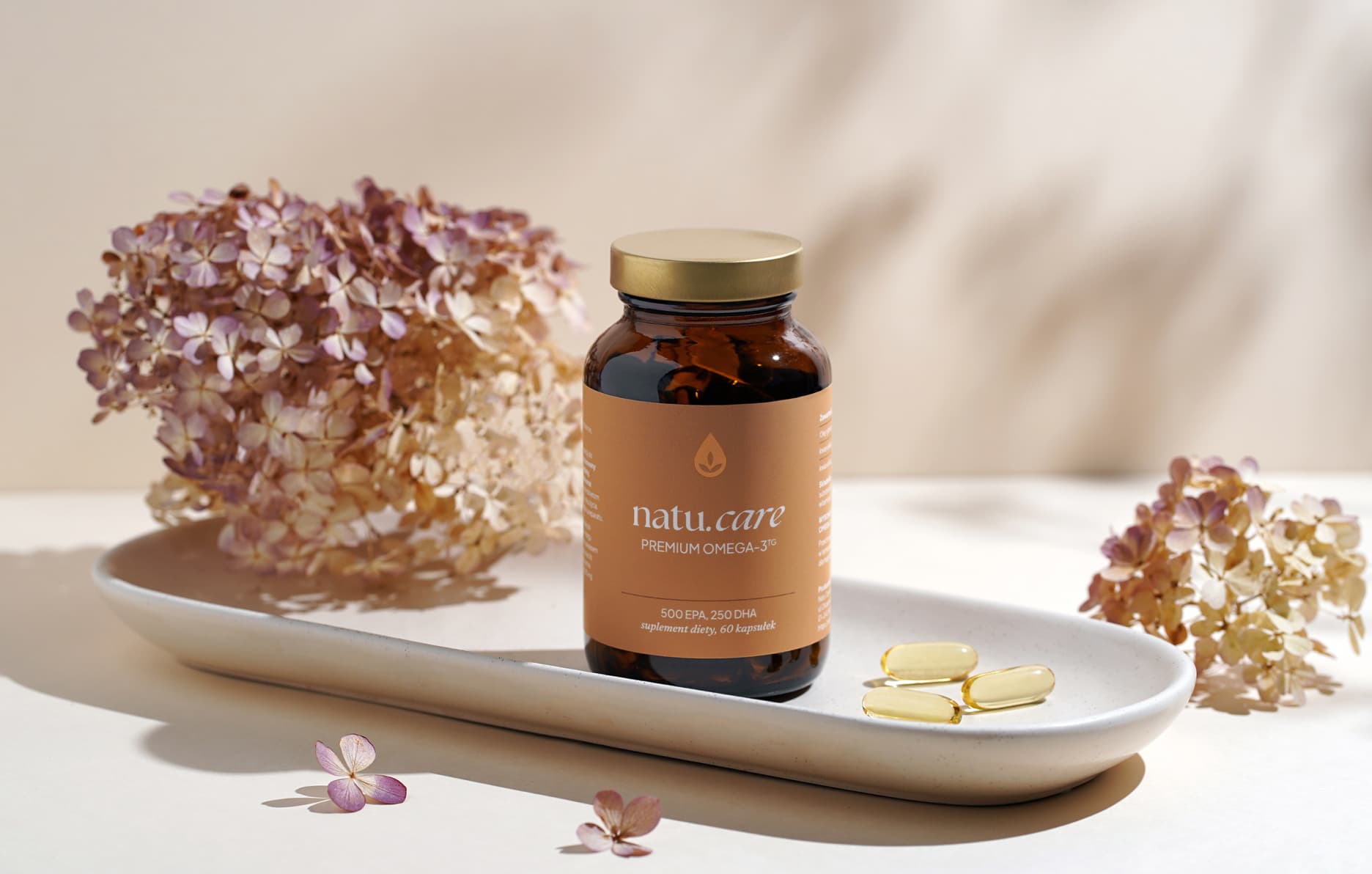
Sprawdź, za co pokochały go tysiące klientek Natu.Care Premium Omega-3ᵀᴳ -15% z kodem BLOG15
Natu.Care Omega-3ᵀᴳ Premium
Natu.Care Omega-3ᵀᴳ Premium dla zdrowia serca, mózgu i odporności. Najlepsza przyswajalność. Optymalna dawka 750 mg. Przebadana przez niezależne laboratorium.
Zobacz więcej
Produkt ma super skład, transparentną etykietę i co dla mnie jest ważne – małe kapsułki do połknięcia. Nie ma też nieprzyjemnego efektu odbijania rybą, który miałam spożywając inne produkty. Widzę znaczną poprawę odporności. Polecam!@Kasia P.
.
Summary
.
- Probiotics will work well if you are taking an antibiotic, have an intestinal complaint and if you want to improve immunity. They can provide protection for the digestive system when travelling long distances, and can also support your wellbeing.
- When treated with an antibiotic, take a probiotic for the entire period of treatment and for another week or two afterwards. .
- Take the probiotic approximately 2-3 hours apart from the antibiotic dose you are taking. .
- Take the probiotic as recommended by the manufacturer or your doctor. Most preparations are better taken in the morning - on an empty stomach, but there are some that can be taken with a meal.
- Do not exceed the recommended dosage.
- Do not exceed the recommended daily dose of the probiotic, as this can lead to an overgrowth of bacterial flora in the gut. .
FAQ
.Can you take probiotics prophylactically?
.You can take probiotics prophylactically. Probiotics support a healthy gut flora, which is key to the proper functioning of the immune and digestive systems. For example, by taking probiotics before travelling to an exotic part of the world, you can protect yourself from so-called travellers' diarrhoea.
Choose researched strains such as: Lactobacillus rhamnosus GG, Saccharomyces boulardii.
According to research, the best combination for treating traveler's diarrhea is: sodium butyrate, rifaximin and a mixture of strains: Lactobacillus acidophilus, Lactobacillus bulgaricus, Bifidobacterium bifidum, Streptococcus thermophilus.
Take them as recommended by the manufacturer, usually on an empty stomach. A balanced intake of probiotics with diet rich in prebiotics (e.g. fibre) provides optimal conditions for the growth of beneficial bacteria.
What not to combine probiotics with?
.Avoid combining probiotics with alcohol. Alcohol can upset the balance of the gut microflora and negate the benefits of taking these supplements. Do not combine probiotics with hot drinks such as coffee or tea. High temperatures can kill the live bacteria cultures. Also limit your intake of fatty foods, as these can delay the movement of probiotics through the digestive system.
Probiotics are also not worth combining with other medications, especially those that change the pH of the stomach.
Why is this important? In order to maximise the benefits of probiotics, you need to ensure optimal conditions for the survival and growth of probiotic bacteria in your body.
Why is this important?
Can probiotics be taken on a daily basis?
.You can, and should, take probiotics every day - for several weeks or for the length of time your doctor recommends. The use of probiotics is particularly recommended after antibiotic therapy to rebuild the bacterial flora and for intestinal disorders.
A balanced diet rich in fibre can also provide natural probiotics and ensure they are in abundance. Fermented foods such as yoghurt, kefir and sauerkraut are excellent sources of these bacteria.
Can a probiotic be taken overnight?
.Yes, probiotic can be taken overnight. Probiotics are most effective when taken on an empty stomach, and this is often possible in the evening. Why is this important? Probiotics are living organisms that have to survive the harsh conditions of the stomach to reach the gut. Taking them at night, when stomach acid production is lower and peristalsis slower, increases the chances of their survival and makes it easier for them to adhere to the intestinal walls.
Does a probiotic help with gas?
.Yes, probiotics can help with gas. These bacteria support a healthy gut flora, which can reduce bloating and gas. You can choose probiotics in the form of dietary supplements, but you can also find them in fermented foods such as yoghurt, kefir or pickles.
For gas problems, also pay attention to your diet. Avoid foods that can increase gas production, such as beans, cabbage, onions and fizzy drinks. Increase your fibre intake, but do so gradually so as not to cause revolution in the gut, as this too can end up increasing gas production.
If the problem is chronic, consult a doctor or nutritionist to tailor diet and supplementation to your individual needs.
Do you lose weight after a probiotic?
.No, from a probiotic alone you will not lose weight. Probiotics are designed to improve gut health, which may indirectly affect weight loss, but they are not a "magic solution to weight loss".
Pharmacist Ilona Krzak explains that research is currently underway, and there has even been an emergent preparation containing Akkermansia muciniphila, which may help with weight loss. However, it doesn't work in such a way that the bacterium will burn fat for us. It improves metabolic parameters and restores homeostasis, thereby regulating the body.
Get a balanced diet and regular exercise. Include products rich in beneficial bacteria in your diet, such as natural yoghurt, kefir and pickles. These products support gut health, which is crucial for proper metabolism, nutrient absorption and can help maintain a healthy body weight.
Do probiotics need to be kept in the fridge?
.Keep probiotics in the fridge if the manufacturer recommends such storage. Often probiotics, especially those containing live bacteria cultures, require refrigeration to maintain their effectiveness. However, more and more products can now be stored at room temperature.
Check the product label - storage information should be clearly marked there. Regardless of whether probiotics require refrigeration, always keep them in a dry, dark place away from direct sunlight. Storage in inappropriate conditions can shorten their lifespan.
Sources
.See all
.Álvarez-Arraño, V., & Martín-Peláez, S. (2021). Effects of Probiotics and Synbiotics on Weight Loss in Subjects with Overweight or Obesity: A Systematic Review. Nutrients, 13(10), Article 10. https://doi.org/10.3390/nu13103627
Amara, A. A., & Shibl, A. (2015). Role of Probiotics in health improvement, infection control and disease treatment and management. Saudi Pharmaceutical Journal, 23(2), 107-114. https://doi.org/10.1016/j.jsps.2013.07.001
Becattini, S., Taur, Y., & Pamer, E. G. (2016). Antibiotic-Induced Changes in the Intestinal Microbiota and Disease. Trends in Molecular Medicine, 22(6), 458-478. https://doi.org/10.1016/j.molmed.2016.04.003
Cheng, J., & Ouwehand, A. C. (2020). Gastroesophageal Reflux Disease and Probiotics: A Systematic Review. Nutrients, 12(1), Article 1. https://doi.org/10.3390/nu12010132
Das, T. K., Pradhan, S., Chakrabarti, S., Mondal, K. C., & Ghosh, K. (2022). Current status of probiotic and related health benefits. Applied Food Research, 2(2), 100185. https://doi.org/10.1016/j.afres.2022.100185
Fatahi, S., Hosseini, A., Sohouli, M. H., Sayyari, A., Khatami, K., Farsani, Z. F., Amiri, H., Dara, N., de Souza, I. G. O., & Santos, H. O. (2022). Effects of probiotic supplementation on abdominal pain severity in pediatric patients with irritable bowel syndrome: A systematic review and meta-analysis of randomized clinical trials. World Journal of Pediatrics, 18(5), 320-332. https://doi.org/10.1007/s12519-022-00516-6
Han, S., Lu, Y., Xie, J., Fei, Y., Zheng, G., Wang, Z., Liu, J., Lv, L., Ling, Z., Berglund, B., Yao, M., & Li, L. (2021). Probiotic Gastrointestinal Transit and Colonization After Oral Administration: A Long Journey. Frontiers in Cellular and Infection Microbiology, 11. https://www.frontiersin.org/articles/10.3389/fcimb.2021.609722
Jakobsson, H. E., Jernberg, C., Andersson, A. F., Sjölund-Karlsson, M., Jansson, J. K., & Engstrand, L. (2010). Short-Term Antibiotic Treatment Has Differing Long-Term Impacts on the Human Throat and Gut Microbiome. PLOS ONE, 5(3), e9836. https://doi.org/10.1371/journal.pone.0009836
Judkins, T. C., Archer, D. L., Kramer, D. C., & Solch, R. J. (2020). Probiotics, Nutrition, and the Small Intestine. Current Gastroenterology Reports, 22(1), 2. https://doi.org/10.1007/s11894-019-0740-3
Kechagia, M., Basoulis, D., Konstantopoulou, S., Dimitriadi, D., Gyftopoulou, K., Skarmoutsou, N., & Fakiri, E. M. (2013). Health Benefits of Probiotics: A Review. International Scholarly Research Notices, 2013, e481651. https://doi.org/10.5402/2013/481651
Liu, W., Xie, Y., Li, Y., Zheng, L., Xiao, Q., Zhou, X., Li, Q., Yang, N., Zuo, K., Xu, T., Lu, N.-H., & Zhang, H. (2022). Protocol of a randomized, double-blind, placebo-controlled study of the effect of probiotics on the gut microbiome of patients with gastro-oesophageal reflux disease treated with rabeprazole. BMC Gastroenterology, 22(1), 255. https://doi.org/10.1186/s12876-022-02320-y
Markowska-Jędra, A. (2020, December 8). Gut-brain axis. NeuroExpert. https://neuroexpert.org/wiki/os-jelita-mozg/
Systematic Review. Nutrients, 14(2), Article 2. https://doi.org/10.3390/nu14020341
Nikolova, V. L., Cleare, A. J., Young, A. H., & Stone, J. M. (2023). Acceptability, Tolerability, and Estimates of Putative Treatment Effects of Probiotics as Adjunctive Treatment in Patients With Depression: A Randomized Clinical Trial. JAMA Psychiatry, 80(8), 842-847. https://doi.org/10.1001/jamapsychiatry.2023.1817
Office of Dietary Supplements-Probiotics. (n.d.). Retrieved 11 August 2023, from https://ods.od.nih.gov/factsheets/Probiotics-HealthProfessional/
Rashid, M.-U., Zaura, E., Buijs, M. J., Keijser, B. J. F., Crielaard, W., Nord, C. E., & Weintraub, A. (2015). Determining the Long-term Effect of Antibiotic Administration on the Human Normal Intestinal Microbiota Using Culture and Pyrosequencing Methods. Clinical Infectious Diseases, 60(suppl_2), S77-S84. https://doi.org/10.1093/cid/civ137
Reid, G., Gadir, A. A., & Dhir, R. (2019). Probiotics: Reiterating What They Are and What They Are Not. Frontiers in Microbiology, 10. https://www.frontiersin.org/articles/10.3389/fmicb.2019.00424
Sabaté, J.-M., & Iglicki, F. (2022). Effect of Bifidobacterium longum 35624 on disease severity and quality of life in patients with irritable bowel syndrome. World Journal of Gastroenterology, 28(7), 732-744. https://doi.org/10.3748/wjg.v28.i7.732
Sanders, M. E., Guarner, F., Guerrant, R., Holt, P. R., Quigley, E. M., Sartor, R. B., Sherman, P. M., & Mayer, E. A. (2013). An update on the use and investigation of probiotics in health and disease. Gut, 62(5), 787-796. https://doi.org/10.1136/gutjnl-2012-302504
Shahrokhi, M., & Nagalli, S. (2023). Probiotics. In StatPearls. StatPearls Publishing. http://www.ncbi.nlm.nih.gov/books/NBK553134/
Stewardson, A. J., Gaïa, N., François, P., Malhotra-Kumar, S., Delémont, C., Tejada, B. M. de, Schrenzel, J., Harbarth, S., & Lazarevic, V. (2015). Collateral damage from oral ciprofloxacin versus nitrofurantoin in outpatients with urinary tract infections: A culture-free analysis of gut microbiota. Clinical Microbiology and Infection, 21(4), 344.e1-344.e11. https://doi.org/10.1016/j.cmi.2014.11.016
Tegegne, B. A., & Kebede, B. (2022). Probiotics, their prophylactic and therapeutic applications in human health development: A review of the literature. Heliyon, 8(6), e09725. https://doi.org/10.1016/j.heliyon.2022.e09725
.Tavakoly, R., Hadi, A., Rafie, N., Talaei, B., Marx, W., & Arab, A. (2021). Effect of Probiotic Consumption on Immune Response in Athletes: A Meta-analysis. International Journal of Sports Medicine, 42(09), 769-781. https://doi.org/10.1055/a-1463-3303
Wallace, C. J. K., & Milev, R. (2017). The effects of probiotics on depressive symptoms in humans: A systematic review. Annals of General Psychiatry, 16(1), 14. https://doi.org/10.1186/s12991-017-0138-2
Wang, Y., Jiang, Y., Deng, Y., Yi, C., Wang, Y., Ding, M., Liu, J., Jin, X., Shen, L., He, Y., Wu, X., Chen, X., Sun, C., Zheng, M., Zhang, R., Ye, H., An, H., & Wong, A. (2020). Probiotic Supplements: Hope or Hype? Frontiers in Microbiology, 11. https://www.frontiersin.org/articles/10.3389/fmicb.2020.00160
.Wicinski, M., Gębalski, J., Gołębiewski, J., & Malinowski, B. (2020). Probiotics for the Treatment of Overweight and Obesity in Humans-A Review of Clinical Trials. Microorganisms, 8(8), Article 8. https://doi.org/10.3390/microorganisms8081148
Yadav, M. K., Kumari, I., Singh, B., Sharma, K. K., & Tiwari, S. K. (2022). Probiotics, prebiotics and synbiotics: Safe options for next-generation therapeutics. Applied Microbiology and Biotechnology, 106(2), 505-521. https://doi.org/10.1007/s00253-021-11646-8
Zaura, E., Brandt, B. W., Teixeira de Mattos, M. J., Buijs, M. J., Caspers, M. P. M., Rashid, M.-U., Weintraub, A., Nord, C. E., Savell, A., Hu, Y., Coates, A. R., Hubank, M., Spratt, D. A., Wilson, M., Keijser, B. J. F., & Crielaard, W. (2015). Same Exposure but Two Radically Different Responses to Antibiotics: Resilience of the Salivary Microbiome versus Long-Term Microbial Shifts in Feces. mBio, 6(6), 10.1128/mbio.01693-15. https://doi.org/10.1128/mbio.01693-15
Zhang, C., Li, L., Jin, B., Xu, X., Zuo, X., Li, Y., & Li, Z. (2021). The Effects of Delivery Mode on the Gut Microbiota and Health: State of Art. Frontiers in Microbiology, 12. https://www.frontiersin.org/articles/10.3389/fmicb.2021.724449
Zhang, Z., Lv, J., Pan, L., & Zhang, Y. (2018). Roles and applications of probiotic Lactobacillus strains. Applied Microbiology and Biotechnology, 102(19), 8135-8143. https://doi.org/10.1007/s00253-018-9217-9
.
Editorials
Meet the team

Ilona Krzak obtained her Master of Pharmacy degree from the Medical University of Wrocław. She did her internship in a hospital pharmacy and in the pharmaceutical industry. She is currently working in the profession and also runs an educational profile on Instagram: @pani_z_apteki

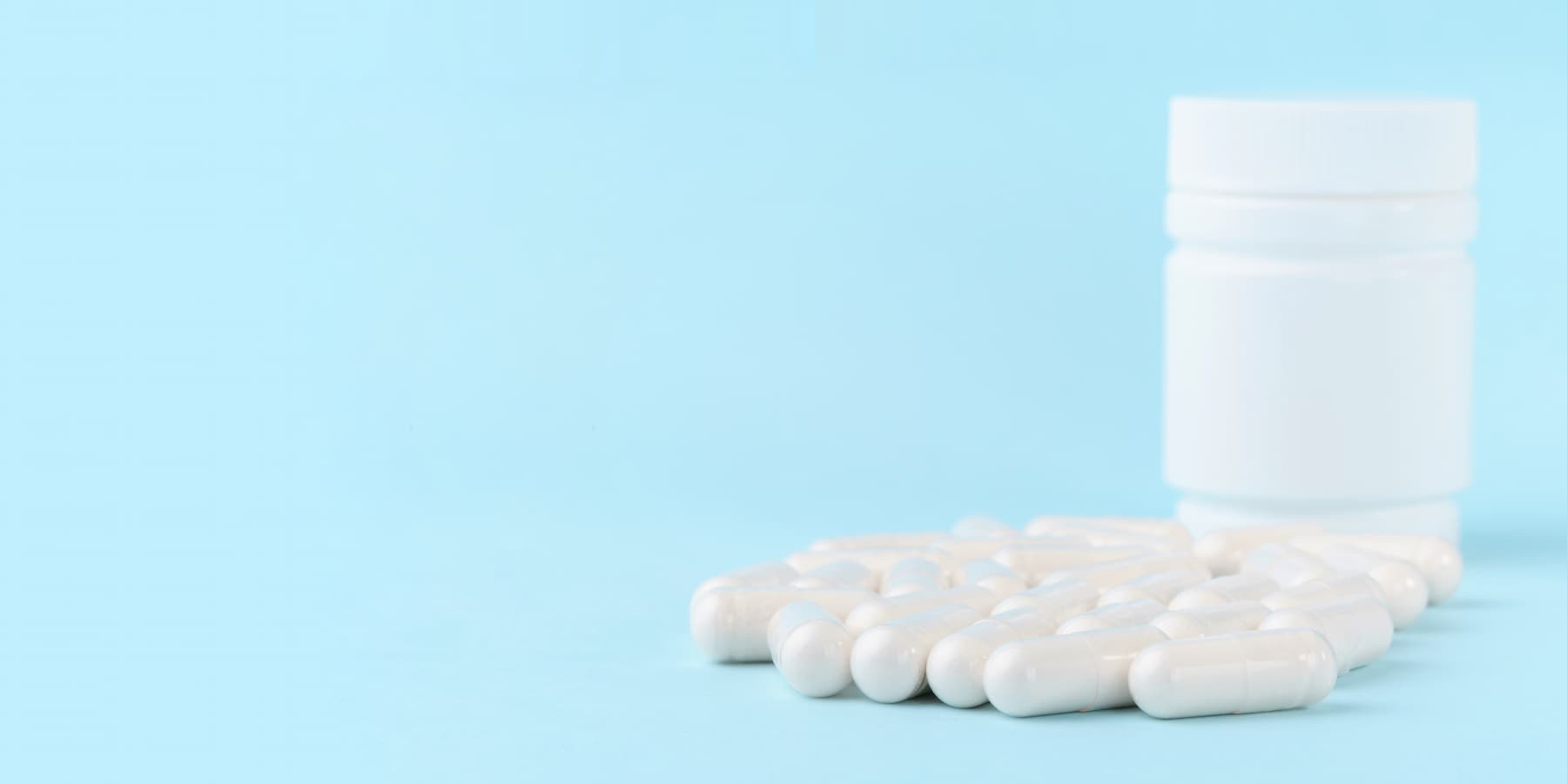
Chondroitin helps the joints and other elements of the body.

Glutathione is one of the most potent antioxidants for supporting the body's health. Find out how it works and where to get it from.

See why hip joints hurt and how to treat their ailments.
